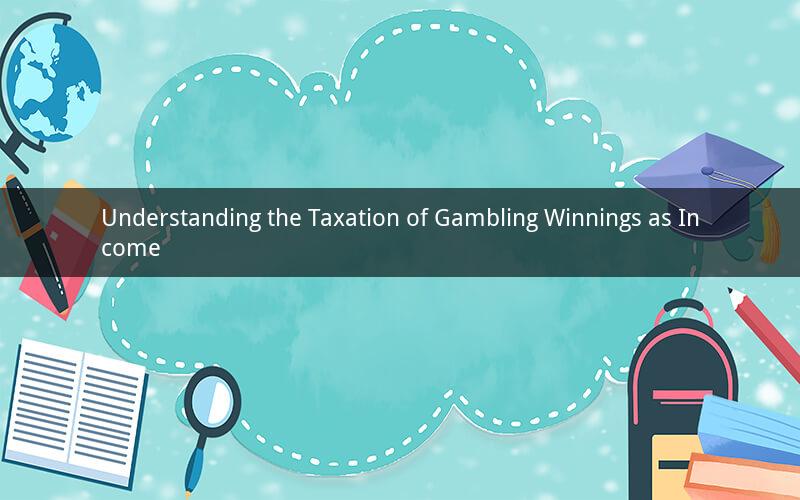
Introduction:
Gambling has been a popular form of entertainment for centuries, offering individuals the chance to win big. However, it's important to understand that gambling winnings are considered income and are subject to taxation. In this article, we will delve into the details of how gambling winnings are taxed, the factors that affect the tax rate, and provide answers to common questions regarding this topic.
1. Are Gambling Winnings Taxable?
Yes, gambling winnings are taxable in most countries. Whether you win at a casino, racetrack, lottery, or any other form of gambling, the earnings are considered taxable income. This includes both cash and non-cash prizes, such as cars, homes, or other valuable items.
2. How Are Gambling Winnings Taxed?
Gambling winnings are taxed at the federal level, and the tax rate depends on your total winnings. The IRS requires you to report all gambling winnings on your tax return, using Form W-2G if you win $600 or more in a single event or $1,200 or more in total winnings from a bingo game, keno, or slot machine. The tax rate for gambling winnings is the same as the rate for other types of income, such as wages or dividends.
3. Factors Affecting the Tax Rate on Gambling Winnings
Several factors can affect the tax rate on your gambling winnings. The most significant factor is your overall income, as the tax rate may increase as your income rises. Additionally, some jurisdictions may have their own tax laws that could impact the rate at which you are taxed.
4. Reporting Gambling Winnings
To report your gambling winnings, you will need to provide the IRS with detailed information about your winnings. This includes the amount of money or value of the prize, the date of the win, and the name and address of the entity that paid the winnings. You can find this information on any W-2G forms you receive from the gambling establishment or lottery.
5. Taxation of Non-Cash Prizes
While cash winnings are straightforward to report, non-cash prizes can be more complex. The IRS considers non-cash prizes as income, and you must report the fair market value of the prize on your tax return. For example, if you win a car worth $20,000, you must report that amount as income, even if you choose to keep the car.
Common Questions and Answers:
1. Q: Do I need to pay taxes on small winnings, such as a $50 cash prize?
A: Yes, all gambling winnings, regardless of the amount, are taxable. However, the IRS may not send you a 1099 form for small winnings, so it's important to keep track of your earnings and report them on your tax return.
2. Q: Can I deduct my gambling losses on my tax return?
A: Yes, you can deduct your gambling losses, but only up to the amount of your gambling winnings. To claim these deductions, you must itemize deductions on Schedule A of your tax return and provide detailed records of your losses, such as receipts or casino statements.
3. Q: Are gambling winnings subject to state taxes?
A: Yes, most states tax gambling winnings. The tax rate and rules for reporting winnings can vary by state, so it's important to consult your state's tax authority for specific information.
4. Q: Can I avoid paying taxes on my gambling winnings by playing offshore?
A: No, playing at offshore gambling sites does not exempt you from paying taxes on your winnings. The IRS has the authority to track and tax gambling winnings, regardless of where the games are played.
5. Q: What if I win a large sum of money, such as a lottery jackpot?
A: Winning a large sum of money, such as a lottery jackpot, can be both exciting and overwhelming. It's important to consult with a tax professional to understand the tax implications and plan accordingly. You may need to pay taxes on the entire amount or in installments, depending on the specifics of the prize.
Conclusion:
Gambling winnings are considered taxable income and must be reported on your tax return. Understanding the tax rules and reporting requirements can help you avoid penalties and ensure that you comply with the law. Always consult with a tax professional if you have questions or concerns about the taxation of gambling winnings.